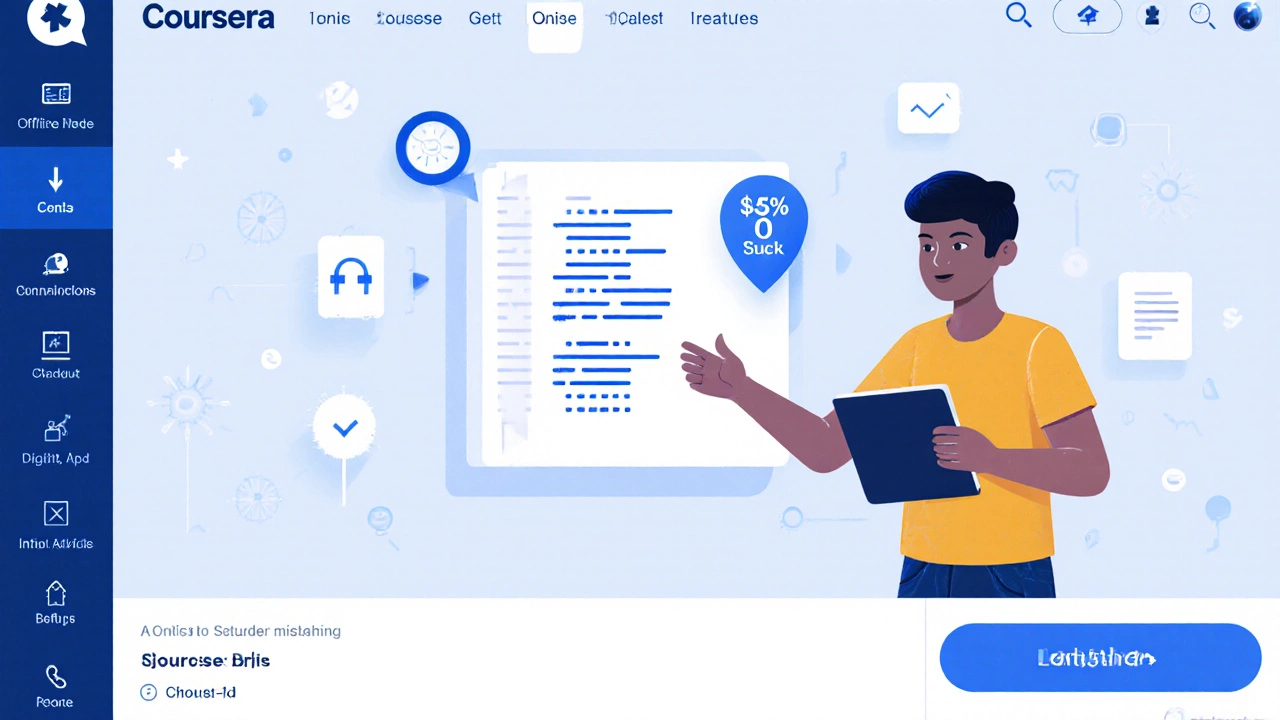Nov
20

- by Dhruv Ainsley
- 0 Comments
Learning Platform Finder
Which learning platform is right for you?
Select your primary learning goal and preferred learning style to find the most suitable platform.
Recommended Platform
When you search for the most used learning platform, you’re not just asking about popularity-you’re asking where millions of people actually go to learn something new. The answer isn’t a single name that everyone agrees on. But if you look at real numbers-enrollments, active users, global reach-there’s one platform that stands out clearly: Coursera.
Coursera leads in global enrollment and institutional trust
Coursera has over 135 million registered learners as of mid-2025. That’s more than double the next largest platform. It’s not just about raw numbers, though. What sets Coursera apart is who’s behind the courses. More than 300 universities and companies, including Stanford, Yale, Google, and IBM, build and host content directly on the platform. You won’t find that level of academic credibility on most other sites.
Think about it: if you’re trying to get a job in data science, you’re more likely to trust a certificate from the University of Michigan than a course from an unknown instructor. Coursera’s partnerships with accredited institutions give it an edge in professional and academic settings. Employers recognize Coursera credentials. In fact, a 2024 LinkedIn survey found that 72% of hiring managers in tech and finance viewed Coursera certificates as valuable when evaluating candidates.
Udemy is bigger in volume but weaker in credibility
Udemy often comes up in this conversation because it has over 60 million learners. That’s huge. But here’s the catch: Udemy’s model is different. Anyone can create a course. There’s no vetting process for instructors. You might find a brilliant Python course from a senior engineer-or a poorly made one from someone who just bought a microphone.
Udemy’s strength is variety. There are over 215,000 courses on everything from Excel shortcuts to advanced blockchain development. It’s the go-to place for niche skills and quick tutorials. But because of that open model, employers rarely accept Udemy certificates as proof of competence. You use Udemy to learn something fast. You use Coursera to prove you learned it.
edX and Khan Academy serve different audiences
edX, founded by MIT and Harvard, has around 45 million users. It’s known for serious, university-level content. Many of its courses are free to audit, but you pay if you want a verified certificate. It’s popular among students preparing for degrees and professionals looking for formal recognition without enrolling in a full program.
Khan Academy, on the other hand, has over 120 million users-but most of them are K-12 students and parents. It’s free, simple, and focused on foundational subjects like math, science, and early literacy. It doesn’t offer professional certifications. If you’re a 14-year-old learning algebra or a parent helping with homework, Khan Academy is perfect. If you’re trying to switch careers, it’s not the right tool.

LinkedIn Learning is growing fast among professionals
LinkedIn Learning has about 25 million active users. Its biggest advantage? It’s built right into LinkedIn. If you finish a course on leadership or Excel, it automatically shows up on your profile. That makes it incredibly convenient for professionals who want to signal skills to recruiters.
Its content is practical and short-most courses are under 2 hours. It’s great for brushing up on tools like PowerPoint, Salesforce, or Agile methodologies. But it doesn’t offer degrees, diplomas, or university-backed credentials. It’s a skill booster, not a career changer.
Why Coursera is the most used platform for serious learners
Here’s the real breakdown:
- Coursera: 135M+ users. University-backed. Professional certificates. Degree programs. Used by employers.
- Udemy: 60M+ users. Instructor-driven. Wide variety. No accreditation. Used by hobbyists and quick learners.
- edX: 45M+ users. Academic focus. Free audits. Paid certificates. Popular in Europe and Asia.
- Khan Academy: 120M+ users. K-12 focused. Completely free. No certifications.
- LinkedIn Learning: 25M+ users. Integrated with LinkedIn. Short, job-relevant courses.
Why does Coursera win on usage? Because it’s the only platform that combines scale with credibility. People don’t just sign up because it’s popular-they sign up because they need something that counts.
Take someone in Indonesia trying to get into software development. They might start with free YouTube tutorials, then take a Python course on Udemy. But when they want to apply for a job, they enroll in a Coursera Professional Certificate from Google or IBM. That’s the path most serious learners follow.

What platform should you use?
It depends on your goal:
- Want a job change or promotion? Use Coursera or LinkedIn Learning. Focus on employer-recognized certificates.
- Need to learn a tool fast? Udemy has the most options. Search for highly rated courses with 10,000+ reviews.
- Are you a student or parent? Khan Academy is free and perfect for math and science basics.
- Want a degree online? Coursera and edX partner with universities to offer full bachelor’s and master’s degrees at a fraction of the cost.
There’s no single platform that’s best for everyone. But if you’re asking which one is used by the most people for meaningful learning-Coursera is the answer. It’s not just the biggest. It’s the one that actually changes careers.
How Coursera stays ahead
Coursera didn’t get to 135 million users by accident. It invests heavily in three things:
- Industry partnerships: Companies like Amazon, Dell, and Salesforce design courses that match their own hiring needs.
- Mobile-first design: 70% of Coursera users learn on phones. The app works offline, which matters in regions with poor internet.
- Financial aid: Over 1 million learners get free access each year through Coursera’s aid program. That opens doors for people in low-income countries.
Other platforms chase features. Coursera chases impact.
What’s next for online learning?
AI tutors are starting to appear on Coursera and edX. You can now practice coding with a real-time AI coach that gives feedback on your syntax. Some courses even adapt their content based on how well you’re doing.
But the core hasn’t changed. People still want to learn from trusted names. They still want proof they’ve learned something. And right now, Coursera delivers that better than anyone else.
Is Coursera really the most used learning platform?
Yes, based on total registered users and active learners, Coursera leads with over 135 million users as of 2025. While Udemy has more course offerings and Khan Academy has more users in K-12, Coursera is the only platform with both massive scale and institutional credibility that drives real career outcomes.
Why not Udemy if it has so many courses?
Udemy has over 215,000 courses, but anyone can create them. There’s no quality control or accreditation. Employers don’t recognize Udemy certificates as proof of skill. You use Udemy to learn something quickly-for example, how to use Canva. You use Coursera to get a credential that helps you get hired.
Is Khan Academy better for students?
For kids and teens learning math, science, or basic reading, Khan Academy is unmatched. It’s free, simple, and designed for school-age learners. But it doesn’t offer professional certifications or college-level content. It’s not meant for adults looking to change careers.
Can I get a degree on Coursera?
Yes. Coursera partners with universities like the University of London, Arizona State, and the University of Illinois to offer fully online bachelor’s and master’s degrees. These degrees are identical to on-campus ones and cost 70-90% less. Many are accredited and recognized globally.
Are LinkedIn Learning certificates worth anything?
They’re useful for showing skills on your LinkedIn profile, especially for soft skills like communication or project management. But they’re not accredited, and employers don’t treat them like formal credentials. They’re a nice bonus-not a replacement for a Coursera or edX certificate.
Which platform is best for non-English speakers?
Coursera offers courses in over 15 languages, including Spanish, French, Mandarin, and Arabic. Many courses have auto-generated subtitles and translations. Khan Academy also offers content in multiple languages, but only for K-12 subjects. For professional learning in your native language, Coursera is the most reliable.





